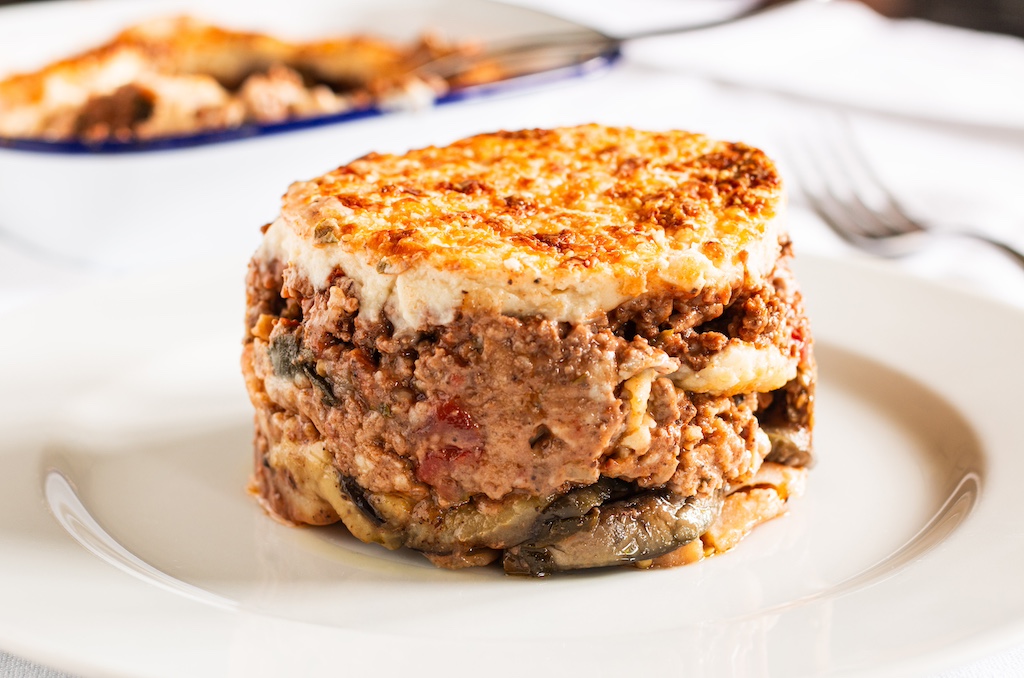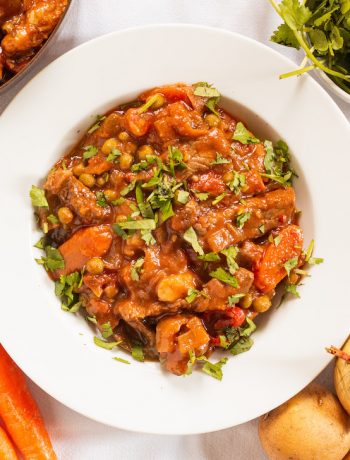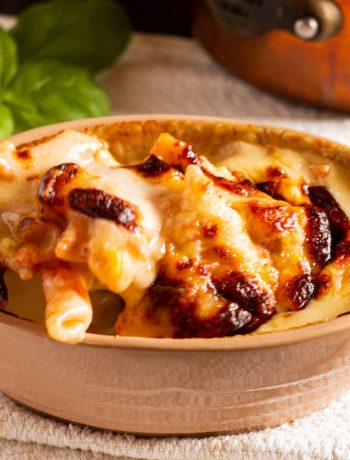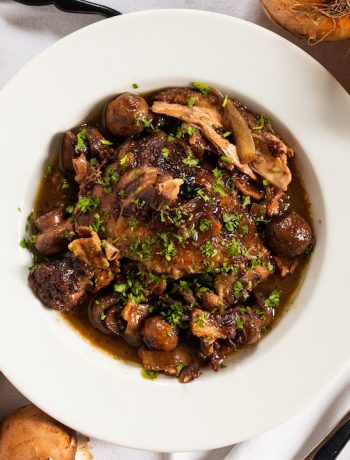Moussaka, as we know it today, was invented in the 1930s by Greek chef Nikolaos Tselementes, who fused an old Levantine dish with a lasagne using French béchamel as the catalyst. The original “musakhkhan” appears in a 12th-century Arabic cookbook as a dish of tomatoes and aubergine. Aubergines were introduced to Greece by the Arabs and gained popularity there in all sorts of preparations. Most food historians agree that Tselementes’ moussaka is based on the old musakhkhan.
As a Greek family favourite, there are variations in published recipes. The most common variations include courgettes and red wine. These ingredients can be used, but if we strip them back to the original, then we miss them out.
Moussaka
Ingredients
- For the base:
- 3 tbsp vegetable oil
- 3 potatoes, thinly sliced
- 2 aubergines, thinly sliced
- Sea salt and freshly ground black pepper
- For the meat sauce
- 2 tbsp vegetable oil
- 1 onion, finely chopped
- 2 cloves garlic, chopped
- 2 sprigs thyme, picked
- 500g minced beef
- 0.5 tsp ground cloves
- 1 tsp cinnamon
- 1 tbsp tomato puree
- 1x 450g can chopped tomatoes
- Large pinch of sugar
- Sea salt and freshly ground black pepper
- 1 handful parsley, chopped
- 1 handful basil torn.
- For the enriched béchamel sauce:
- 90 g butter
- 90g plain flour
- 750ml milk
- Whole nutmeg
- 3 egg yolks
- 50g, Parmesan
- Sea salt and freshly ground black pepper
- To assemble
- 50g Parmesan, grated
Instructions
To make the base:
Heat the oil in a frying pan and fry all the vegetables in batches until nicely gilded. Set aside.
To make the meat sauce:
Heat the oil in a large pan, Add the vegetables and stew gently until softened (add some more oil if everything is a bit dry). Add the garlic, and cook for 1 minute. Add the meat and leave on the stove, stirring constantly, until lightly browned. Add the spices, mix and cook for 1 minute more. Add the tomatoes, can juice, purée, stock, sugar and thyme, and simmer for at least 1 hour, adjusting the seasoning as you go. Off the heat, stir in the parsley and basil. At this point, letting the sauce cool with a lid on it for a while is always going to be good. Like any casserole it's better the next day.
To make the enriched béchamel:
Start by warming the milk with the onion, bay and mace. Leave to cool and infuse. Melt the butter, add the flour and cook for a minute or so. Start slowly adding the milk but by bit without boiling until all the milk is used, and the sauce is thick and creamy. Season and grate in a little nutmeg. Off the heat,whisk in the egg yolks and Parmesan. You can set the sauce aside without a skin forming if you cover the surface of the sauce with some cling wrap.
To assemble:
Heat an oven to 180˚C.
Layer the potatoes and aubergines in the bottom of a gratin dish. Put the dish on a baking tray.
Add a ladle of béchamel sauce to the meat sauce, mix, and layer over the vegetables. Pour over the rest of the béchamel, sprinkle the remaining Parmesal over the moussaka and bake in the oven for 30 mins.
Increase the temperature to 200˚C and cook for a further 10 mins until golden on top. Serve.






No Comments